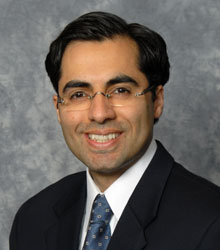20 Oct LVADs Improve Survival and Quality of Life In Some Heart Failure Patients
 MedicalResearch.com Interview with:
MedicalResearch.com Interview with:
Jerry D. Estep, MD, FACC, FASE
Associate Professor of Clinical Cardiology
Houston Methodist Institute of Academic Medicine
Section Head of Heart Transplant & Mechanical Circulatory Support, Division of Heart Failure
Medical Director, Heart Transplant & LVAD Program
Methodist DeBakey Heart & Vascular Center
Houston Methodist
Medical Research: What is the background for this study? What are the main findings?
Dr. Estep: Data for left ventricular assist devices (LVADs) in non-inotrope-dependent advanced heart failure (HF) patients are limited. The risk-benefit tradeoff of LVADs versus optimal medical management (OMM) in this patient cohort is not well understood. ROADMAP is the first prospective, nonrandomized, observational study comparing LVAD support to OMM in advanced, ambulatory HF patients who are not dependent on intravenous inotropic support, and meet the FDA-approved indications for LVAD destination therapy. The main 5 findings from the ROADMAP Study include the following:
1) LVAD patients were more severely ill, with more INTERMACS profile 4 compared to OMM patients (65% LVAD vs. 34% OMM, p < 0.001);
2) more LVAD patients met the primary endpoint of survival on original therapy with improvement in 6 minute walk distance of at least 75 meters at 12 months (39% LVAD vs. 21% OMM; [OR: 2.4 [95% CI: 1.2 to 4.8]; p = 0.012) with differences in the primary endpoint primarily due to the use of delayed LVADs in the OMM group;
3) on the basis of as-treated (event free) analysis, 12-month survival (freedom from death, urgent transplant, or delayed LVAD) was greater for LVAD versus OMM (80 ± 4% vs. 63 ± 5%, p = 0.022);
4) adverse events (AEs) were higher in LVAD patients, at 1.89 events/patient-year (eppy), primarily driven by bleeding (1.22 eppy), than with OMM, at 0.83 eppy, primarily driven by worsening HF (0.68 eppy); and
5) health-related quality of life and depression improved from baseline more significantly with LVADs than with OMM (Δvisual analog score [VAS]: 29 ± 25 vs. 10 ± 22, p < 0.001 and ΔPHQ9: -5 ± 7 vs. -1 ± 5, p < 0.001).
Medical Research: What should clinicians and patients take away from your report?
Dr. Estep: Event free survival with improved functional status was better with LVADs compared to optimal medical management in a select, advanced, non-inotrope dependent HF population. Health related quality of life and depression improved more with LVADs, even with adverse events being more frequent. ROADMAP provides new and very important risk-benefit information to guide patient and physician decision-making regarding LVAD and optimal medical management therapy in an ambulatory advanced HF population.The results support the use of the HMII LVAD under existing approved indications in functionally limited non-inotrope-dependent heart failure patients with poor quality of life.
Medical Research: What recommendations do you have for future research as a result of this study?
Dr. Estep: Randomized studies are needed to further define the benefits and risks of LVADs in patients with less severe heart failure with focus on quality of life metrics in addition to functional capacity and event free survival.
Citation:
[wysija_form id=”5″]
Last Updated on October 20, 2015 by Marie Benz MD FAAD
